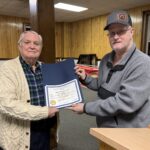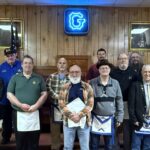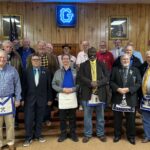William Phillip Brewer, or simply “P.” as he was known to his friends and lodge brothers,
was born on July 30th, 1826 in Carter County, Tennessee to Ben and Sara Elizabeth Carter
Brewer, known familiarly as “Sally.” William was the eldest of three children. His father died in
1848 and is buried in the Carter Cemetery in Carter County, Tennessee. His mother was the
daughter of Colonel Landon Carter, an early political figure in what would become Tennessee
and the man for whom Carter County is named for. As a young man, William attained an
education at Washington College, which lies five miles west of Jonesboro and is the oldest
college west of the Blue Ridge Mountains, being chartered in 1783 by the state of North
Carolina, and of which his grandfather, Colonel Carter was a trustee and incorporator. In 1850
Brother Brewer was still living in the home of his widowed mother and working as a merchant,
according to census records.
William married Elizabeth “Lizzie” Netherland at Kingsport, Tennessee on December 18,
1851. She was the daughter of Richard and Margaret Woods Netherland, who founded the
Netherland Inn on the Great Stage Road in what is now Kingsport. The couple then removed to
Jonesboro, where the 1860 census shows he was a merchant with an estate valued at over
$34,000, which would have been a small fortune at that time. He was also a slave holder, as
were most of the charter members of this lodge, keeping three males and three females in
bondage. The family moved to Bristol this same year, as he accepted a position as the agent for
the East Tennessee and Virginia Railroad.
The 1860s was, of course, a very turbulent decade in the entire country, and somewhat
especially in Bristol, Sullivan County being the only one in East Tennessee to vote for secession
along with the whole of Virginia. Between war, political strife, internal problems and outright
sabotage by Union troops, the railroad was utterly destroyed. The state of Tennessee granted
large sums of cash after the war’s close to rebuild the railroad, but it wasn’t enough to allow
the overseeing corporation to retain complete autonomy, and they merged with the East
Tennessee and Georgia Railroad Company on November 26, 1869 to form the East Tennessee,
Virginia and Georgia Railroad.
The late 1860s saw William come out of retirement and re-establish himself as a
merchant in the new, but fast growing town. Sometime in the middle of the decade he had
formed a partnership with L.F. Johnson in the firm of Johnson-Brewer and Company. They
operated a produce commission house near the original train depot in what was then known as
Goodson, Virginia. This business seems to have dissolved in 1869, as many of the first
businesses in Bristol did in those early days.
The decade also saw Brother Brewer serving as an alderman for Bristol, Tennessee.
When the Reverend James King, after whom this lodge is named, deeded land on the southeast
corner of Fifth and Olive Streets on July 14th, 1866, Brother Brewer was named one of the first
three trustees of what would become King College on August 5th, 1867. The other two trustees
were Brothers Joseph R. Anderson and John G. King. He was instrumental in the founding of
Sullins College and as a trustee was a signer of the deed when the land was conveyed to the
new school by Mr. Joseph Johnston of Philadelphia, Pennsylvania on October 27th 1869.
He went on to serve as the town’s third Deputy Postmaster, being sworn in on June
29th, 1875, and was noted by all for his kind and personal service. Editor of the Bristol News,
I.C. Fowler wrote of him,” Mr. W.P. Brewer has taken active charge of the postoffice, and we
must say no better selection could have been made …. (He) is accurate, patient and
accommodating.” As a testament to his patience, a Bristol old timer recalled Brewer sitting on a
bench in front of the Post Office building, reading and explaining a business letter to an old
citizen who could not read or write, and then took up a pen and paper and wrote a reply for the
old gentleman.
Extensive research has yet been able to produce exact addresses for William and Lizzie’s
home during this period. The census in those early days only lists family numbers and not street
addresses. There is no city directory that reaches back that far, likely because Bristol was little
more than a small village at that time. However, the town really gathered steam in the 1870’s
and had soon outgrown its original 100 acre tract. The decade saw four expansions in land area
beginning in 1872 with the Burson land sale along and north of what is now West State Street.
The next was the Meadow Square sale which included the area north of the original downtown
area of Bristol, VA. The third was the Johnston land sale in 1876, encompassing what is known
as Solar Hill.
On April 26, 1877, WIiiiam bought three lots on what was an extension of the original
Third Street for $31 each. In those days, landthat bordered the rail yard was considered prime, and citizens built fine homes on them. William was no exception, and built a grand two story home on the lots for his family. It was only a short walk to King Lodge on Main Street from his home and only a short distance further to the storefront of his tinware shop and insurance office. This house sat on the ground now occupied by the Fabricraft business.
It is unknown to this author exactly when and where Brother Brewer was initiated, passed and raised. It could have been in Rhea Lodge #42 in Jonesborough, or it could have been in Shelby Lodge #162 in Bristol, VA. Shelby Lodge was chartered on December 15, 1857, and William was definitely a member of that Lodge. A clipping of the Bristol News from June 11, 1869 stated that he had been elected Secretary of that Lodge for the ensuing year. It should be safe to assume that he was a member of that Lodge by 1865. What is known; however, is that he was a charter member of King Lodge #461. A letter contained in the archives of the Grand Lodge of Tennessee dated June 8, 1874 stated:
J. Frizzel, Esq.
Grand Secretary
Dear sir and Brother,
It is my honor as well as my duty this morning to inform you that King Lodge
#461 was organized last night, UD, with the following officers
James A. Templeton -WM
J.G. Pepper – SW
Thomas Johnston – JW
Charles R. Vance – Treasurer
W.P. Brewer- Secretary
W.L. McFarland – SD
George C. Pile – JD
W.B. Hayes – Steward
E.A. Warren – Steward
Wm. H. Briscoe – Tyler
In opening the books of the Lodge I would be very grateful for any forms or
instructions you may be kind enough to send me, also any copy of bylaws you may have
on hand for the benefit of our committee on bylaws.
Allow me to say that our new Lodge opened under favorable circumstances and
of no unhandy touch be given it. We hope it may have a long and happy life with a very
numerous progeny.
Very truly,
W.P. Brewer
The Brethren of our new Lodge asked Brother Brewer to hold the Secretary’s place in
the Lodge for the next twenty years. They allowed him to relinquish it only at his request to
retire at the elections of 1894. He assisted the first eight presiding Worshipful Masters in
navigating all the important and mundane issues of the Lodge. The minutes of the first thirteen
years of this Lodge are missing, but we can follow their actions beginning in May of 1887.
Brother Brewer helped us through the earliest days when we met at Temperance Hall, and
urged the Sons of Temperance to make needed improvements to the aging building. He helped
us through the move to 412 Main Street in the third floor hall over Joseph Anderson’s National
Bank of Bristol Building. He helped us through the move and rebuilding of our Lodge furnishings
when a tornado destroyed the third floor of the bank building in June of 1893.
He did all of this while operating no less than two businesses at any given time, serving
in the city’s government, serving as the Secretary and Recorder of the York Rite Bodies, first in
Bristol, Virginia, and then in Bristol, TN when he helped to stand up the Anderson Chapter No. V
126 and St. Omer Commandery No. 19, serving as the Secretary for various other fraternal
organizations and raising a family. His dedication to our fraternity cannot be questioned. And
regarding the matter of his expressed desire that the Lodge have a numerous progeny, two of
his very own progeny, John Alfred “Alf’ Brewer and James King Brewer became Master Masons
in King Lodge. They, like their father, were very industrious men, operating several lines of
business, including a partnership with their father in the W.P. Brewer and Sons Tinware
Company at 530 Main Street in Bristol, TN.
After his retirement from the Lodge, in late December, 1903 William had a bad fall on a
granolithic sidewalk, that is a concrete material with an aggregate rock mixed within, creating a
surface that can be rough and uneven if not properly finished. He sustained a broken leg and
sprained his arm, among other injuries. This accident forced the aged brother to take to his bed
to heal. He never rose from that bed again. In mid-January, his daughter Maggie came to visit
her father from Chattanooga and found him somewhat improving. However, toward the end of
the month he was critically ill, and no expected to survive. The complete lack of healing in the
broken bone had caused his attending physician to abandon all hope of his recovery, and
Brother Brewer passed away at the home of his son, James at 226 Johnson Street, Bristol,
Virginia, on January 29th, 1904.
In his will, written in January 1897, William wrote, “As to my funeral let it be plain and simple a funeral service chaste where no person talks. I trust only in God’s amazing mercy for salvation and try to exercise faith in His name. Only His blood can cleanse a sinner. I have been honored by my Masonic friends and can lend their funeral rites are not objectionable to me particularly by the Knights Templar.” The funeral was conducted from the First Presbyterian Church, of
which he had long been a member, at 2:30PM on Sunday, January 31st. It appears, however, that his last wishes were not followed to the letter, with eulogies professed by Drs. J. Albert Wallace,
W.S. Neighbors, and W.D. Cochran. He was interred in East Hill Cemetery in Bristol, Tennessee. The funeral and burial were highly attended, Brother Brewer being such a widely known and well respected citizen.
Anecdotally, while researching information for this sketch, the address of the home in which Brother Brewer died in sounded very familiar to this writer. Digging a little deeper I discovered that it is a home that has long drawn my interest. At one point I almost bought it, but it was in disrepair and the price was far too high for a starving college student that was just out of the military. I did tour the home multiple times with the venerable Bud Phillips, an old friend of mine that lived two doors down from the house of interest. Bud related a ghost story to me that several former occupants of the house had told him years earlier. There apparently is an apparition that wanders the halls of the home on Johnson Street dressed in a World War I uniform. With this 25 year old memory fresh in my mind once again, I couldn’t let it rest.
It turns out that at the time of Brother Brewer’s death, his eight year old grandson, James Carlock Brewer, was a resident of the home. Several years later, young James had
completed his education at Virginia High School, attended James C. Brewer in 1917 Tennessee Military Institute and had served as a Second Lieutenant in Company H of the Tennessee National Guard during the Mexican Border War in 1916-17. Upon returning to Bristol, he was sent to the Tennessee Officer Candidate School. Upon graduation he was assigned to the 51st Company, 5th Regiment, 2nd Division, American Expeditionary Forces, United States Marine Corps, and shipped from Hoboken, NJ to France in September of 1917. On June 11, 1918, while leading his men in a charge across “No Man’s Land” in the Battle of Belleau Wood, he was killed when a German machine gun bullet struck him in the chest.
Military logistics during and after World War i were very primitive in comparison to what we know today. Thus, it took the War Department over three years to locate, identify and return Lt. Brewer’s remains to his family. The funeral was finally conducted from the First Presbyterian Church Sunday, September 4, 1921, with the James C. Brewer Post of the
American Legion conduction full military honors. Lt. Brewer was LT James c. Brewer in East Hill Cemetery not a Freemason, being away on military duties since prior to his 21st birthday, but had he survived, he would have no doubt continued the family legacy. At least I know who the ghost on Johnson Street may actually be.
Article by Bro. Shane Bouton




